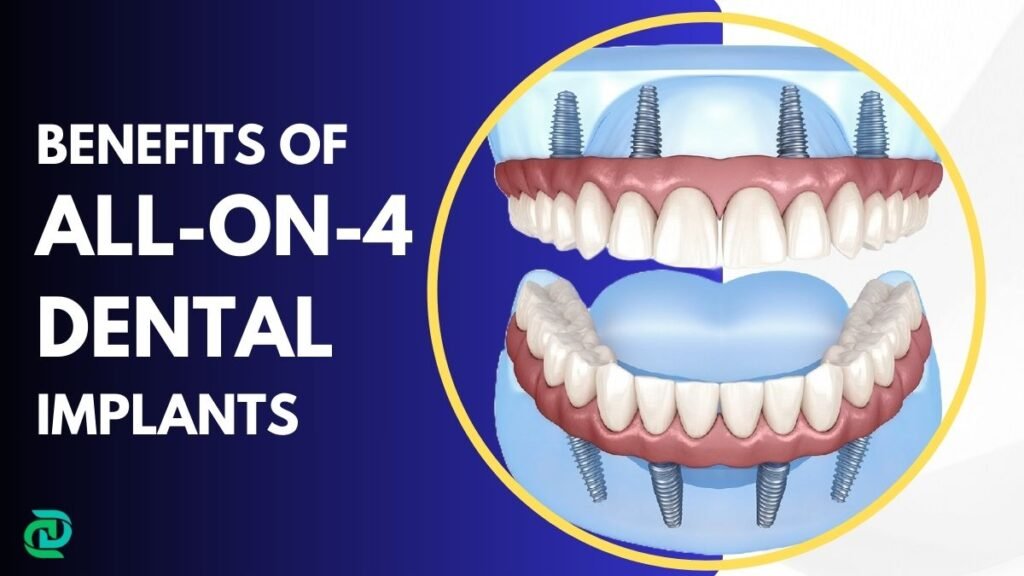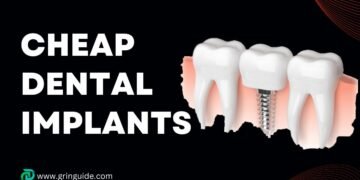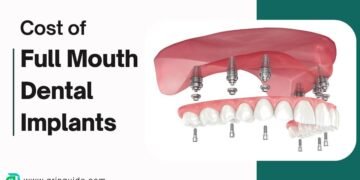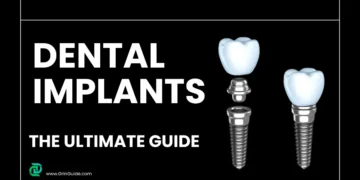Table of Contents
Introduction
All-on-4 dental implants represent a revolutionary solution for individuals experiencing extensive tooth loss. Unlike traditional dental implants, which often require a separate implant for each missing tooth, the All-on-4 approach utilizes just four strategically placed implants to support a full arch of prosthetic teeth. This method significantly reduces the number of implants needed, making the procedure less invasive and more cost-effective.
The primary purpose of All-on-4 dental implants is to provide a stable and permanent replacement for natural teeth, offering enhanced functionality and aesthetics. This stability is achieved through the unique placement of the implants, where two implants are positioned at the front of the jaw and two at the back, angled to maximize bone contact. This strategic placement not only ensures a secure fit but also minimizes the need for bone grafting, a common requirement with traditional implant methods.
One of the key advantages of All-on-4 dental implants is the immediate improvement in both appearance and oral function. Patients who opt for this treatment can often leave the dental office with a full set of functioning teeth on the same day as the procedure. This immediate transformation is particularly appealing for individuals who have struggled with removable dentures, which can be unstable and uncomfortable. All-on-4 implants offer a more natural-looking and feeling alternative, enhancing self-confidence and quality of life.
Additionally, All-on-4 dental implants help preserve jawbone health, preventing the bone deterioration that typically accompanies tooth loss. This preservation is crucial for maintaining facial structure and avoiding the sunken appearance that can result from prolonged denture use. As a result, All-on-4 implants not only improve dental health but also contribute to overall facial aesthetics.
In summary, All-on-4 dental implants provide a comprehensive solution for those facing significant tooth loss, offering superior stability, enhanced aesthetics, and improved oral health. Their innovative design and numerous benefits make them an increasingly popular choice among patients and dental professionals alike.
Costs of All-on-4 Dental Implants
The financial investment required for All-on-4 dental implants can be significant, but it is important to understand the various factors that contribute to the overall cost. On average, the cost for All-on-4 dental implants can range from $15,000 to $30,000 per arch, depending on several influencing elements. These elements include the geographic location of the dental practice, the expertise and reputation of the dental surgeon, and the materials used in the implants themselves.
1. Geographic Location
Geographic location plays a crucial role in determining the cost. Urban areas or regions with a higher cost of living often have higher prices for dental procedures. Conversely, rural or less populated areas may offer more affordable options.
This variance underscores the importance of researching and potentially considering travel for more cost-effective treatment.
2. Experience and skill
The experience and skill of the dental surgeon is another critical factor. Surgeons with extensive experience or specialized training in All-on-4 dental implants may charge a premium for their services.
However, this higher cost is often justified by the increased likelihood of a successful outcome and reduced risk of complications. It is advisable to balance cost considerations with the surgeon’s qualifications and patient reviews.
3. Materials used
The materials used in All-on-4 dental implants also influence the price. High-quality materials such as titanium, which is commonly used for the implant posts due to its strength and biocompatibility, can increase the cost. Additionally, the type of prosthetic teeth, whether acrylic or porcelain, impacts the overall price, with porcelain generally being the more expensive option.
For many patients, the upfront expense of All-on-4 dental implants can be daunting. However, various financing options are available to help manage the cost.
Many dental practices offer payment plans, and third-party financing companies provide loans specifically for medical and dental procedures. Additionally, some dental insurance plans may cover a portion of the cost, though it is essential to verify the specifics with the insurance provider.
When comparing the implants cost of All-on-4 dental implants to other tooth replacement options, such as traditional dentures or single implants, the initial expense may appear higher. However, it is essential to consider the long-term benefits and potential cost savings. All-on-4 implants offer a permanent solution with fewer maintenance needs and a significantly longer lifespan, making them a cost-effective choice over time.
Benefits of All-On-4 Dental Implants
All-on-4 dental implants present a multitude of benefits that make them a preferred choice over other tooth replacement options. One of the primary advantages is the significant improvement in oral health. Unlike conventional dentures, All-on-4 implants are securely anchored into the jawbone, which helps in maintaining bone density and preventing bone resorption. This not only ensures a healthier jawbone but also supports the facial structure, thereby preventing the sunken appearance often associated with missing teeth.
Enhanced aesthetics is another compelling benefit of All-on-4 dental implants. The implants are designed to look and feel like natural teeth, offering a seamless and attractive smile. This can greatly boost an individual’s confidence and self-esteem. The custom-made prosthetics are tailored to match the patient’s natural teeth color and shape, providing a harmonious and pleasing appearance.
Functionality is significantly improved with All-on-4 dental implants. Patients experience better chewing and speaking capabilities compared to traditional dentures. The secure fit of the implants allows individuals to enjoy a wider variety of foods without the worry of slippage or discomfort. This enhanced functionality not only contributes to better nutrition but also facilitates clearer speech, as the implants do not shift or cause mumbling.
The convenience of a fixed solution is another major advantage. All-on-4 dental implants eliminate the need for messy adhesives or nightly removals, which are common inconveniences with traditional dentures. Once installed, the implants function like natural teeth, requiring only regular brushing and dental check-ups, making them a hassle-free and long-term solution for tooth replacement.

Overall, the All-on-4 dental implants offer a comprehensive solution that addresses both aesthetics and functionality, contributing to improved oral health and a higher quality of life. This innovative approach provides a stable, durable, and visually appealing option for those seeking an effective and convenient method of tooth replacement.
Candidacy: Who is a Good Candidate?
The suitability for All-On-4 dental implants hinges on several critical factors, each playing a pivotal role in the overall success and longevity of the implants. The primary consideration is bone density. Adequate bone volume is essential to anchor the implants securely; insufficient bone may necessitate additional procedures such as bone grafting. A comprehensive assessment by a dental professional is vital to ascertain the bone’s condition and determine if it can support the implants.
Oral health is another significant criterion. Candidates should have good gum health, free from periodontal diseases like gingivitis or periodontitis, as these conditions can compromise the stability and integration of the implants. Oral hygiene practices and a commitment to maintaining them post-procedure are equally crucial, ensuring the long-term success of the All-On-4 dental implants.
General health conditions also profoundly impact candidacy. Chronic illnesses such as diabetes, cardiovascular diseases, or autoimmune disorders can affect healing and integration processes. It’s imperative for potential candidates to disclose their full medical history to their dental professional, who will evaluate the risks and benefits in collaboration with the patient’s primary healthcare providers.
Lifestyle considerations play a non-negligible role as well. Smoking, for example, can impair healing and increase the risk of implant failure. Patients are generally advised to quit smoking before and after the implantation procedure to foster optimal recovery and integration. Additionally, a lifestyle that supports good overall health, including a balanced diet and regular exercise, can greatly enhance the success rate of All-On-4 dental implants.
The importance of a thorough evaluation by a dental professional cannot be overstated. This assessment includes clinical examinations, imaging studies such as X-rays or CT scans, and a detailed review of the patient’s medical and dental history. This comprehensive evaluation ensures that all potential risks are identified and mitigated, paving the way for a successful All-On-4 dental implant procedure tailored to the individual’s unique needs.
The Procedure: What to Expect
The All-On-4 dental implants procedure is a transformative journey, designed to restore both function and aesthetics for patients with significant tooth loss. The process begins with an initial consultation, where a thorough examination is conducted. During this consultation, diagnostic imaging such as X-rays or CT scans are used to assess bone density and structure, ensuring candidacy for the procedure. The dentist will also discuss your medical history, expectations, and devise a personalized treatment plan.
Pre-operative preparations are crucial for a successful outcome. These preparations typically involve detailed planning and may include oral hygiene instructions, dietary guidelines, and sometimes antibiotic prophylaxis to minimize infection risks. Patients might be advised to refrain from eating or drinking for a specified period before the surgery.
On the day of the procedure, local anesthesia or sedation is administered to ensure patient comfort. The surgical process begins with the extraction of any remaining teeth, if necessary. Following this, the dentist strategically places four titanium implants into the jawbone. These implants are positioned at specific angles to maximize contact with the bone, providing a stable foundation for the prosthesis. This innovative approach often eliminates the need for bone grafting, a significant advantage of the All-On-4 method.
Immediately after implant placement, a temporary prosthesis is attached. This provisional set of teeth allows patients to leave the clinic with a functioning smile on the same day, a hallmark of the All-On-4 dental implants technique. The temporary prosthesis also aids in the healing process, as it minimizes pressure on the implants during osseointegration—the period where the implants fuse with the bone.
Post-operative care is essential for the success of the All-On-4 implants. Patients are provided with detailed aftercare instructions, including guidelines on oral hygiene, dietary restrictions, and activity limitations to ensure optimal healing. Follow-up appointments are scheduled to monitor progress and address any concerns. Once the healing is complete, typically after a few months, the temporary prosthesis is replaced with a custom-made permanent prosthesis, designed to offer long-lasting functionality and aesthetics.
Pain and Recovery Process of All-on-4 Dental Implants
Undergoing the All-on-4 dental implants procedure can be a transformative experience, yet understanding the associated pain and recovery process is crucial for prospective patients. During the surgery, patients are typically under local anesthesia or sedation, which significantly minimizes discomfort. However, as the anesthesia wears off, it is common to experience some level of pain or discomfort. This pain varies among individuals but is generally described as moderate and manageable with prescribed pain medications.
In the initial 24 to 48 hours post-surgery, patients might encounter swelling and bruising around the implant sites.
- It is advisable to apply ice packs intermittently to reduce swelling and follow a soft food diet to avoid exerting pressure on the new implants.
- Over-the-counter pain relievers, such as ibuprofen, can help manage mild pain, but stronger prescription medications may be necessary for more intense discomfort.
The typical recovery timeline for All-on-4 dental implants spans several months, with the first week being the most critical. During this period, patients should adhere strictly to their dentist’s post-operative care instructions, maintain impeccable oral hygiene, and attend all follow-up appointments.
The initial healing phase usually takes about one to two weeks, during which soft foods and careful oral care are recommended. Full osseointegration, where the implants fuse with the jawbone, generally occurs over three to six months.
To ensure a smooth recovery, patients should avoid smoking and alcohol consumption, as these can impede the healing process. Additionally, engaging in strenuous activities should be limited to prevent undue stress on the implants. In the event of unusual symptoms such as severe pain, excessive bleeding, or signs of infection, it is imperative to contact the dental provider promptly.
Adhering to these guidelines can significantly enhance the recovery experience and contribute to the long-term success of All-on-4
Potential Downsides of All-on-4 Dental Implants
While All-on-4 dental implants offer numerous benefits, there are potential downsides and risks that should be carefully considered. One of the primary concerns is the surgical risks involved. As with any surgical procedure, there are inherent risks such as infection, bleeding, or adverse reactions to anesthesia. The surgery necessitates careful planning and precision, and complications, although rare, can arise during or after the procedure.
Another significant risk is the potential for implant failure. Although All-on-4 implants boast high success rates, there is still a possibility that the implants may not integrate properly with the jawbone, leading to loosening or failure. Factors that can influence implant success include the patient’s oral hygiene, smoking habits, and overall health. It is essential for candidates to follow post-operative care guidelines meticulously to minimize the risk of failure.
Bone density requirements also play a crucial role in the success of All-on-4 dental implants. Candidates must have adequate bone density in the jaw to support the implants. In cases where the bone is insufficient, additional procedures such as bone grafting may be necessary, which can extend the treatment timeline and increase costs. This requirement can be a limiting factor for some patients, particularly those who have experienced significant bone loss.
Health conditions can also impact candidacy for All-on-4 implants. Patients with uncontrolled diabetes, autoimmune disorders, or those undergoing treatments such as radiation therapy to the jaw may not be suitable candidates. These conditions can impair healing and increase the risk of complications post-surgery.
Lastly, lifestyle and maintenance considerations are important to note. While All-on-4 dental implants are designed to be durable and low-maintenance compared to traditional dentures, they still require diligent oral hygiene and regular dental check-ups to ensure their longevity. Patients must commit to a rigorous oral care routine and be mindful of habits that could jeopardize the implants, such as smoking or neglecting dental visits. These lifestyle adjustments and maintenance efforts might be seen as drawbacks by some individuals.
The Number of Teeth Provided by All-on-4 Dental Implants
All-on-4 dental implants are a revolutionary solution designed to restore a full arch of teeth with minimal invasiveness. Typically, this procedure provides patients with a complete set of 12 to 14 teeth per arch. This means that whether the patient requires a restoration of the upper jaw, lower jaw, or both, a total of 24 to 28 teeth can be replaced, offering a comprehensive and aesthetically pleasing solution.
The All-on-4 technique involves the strategic placement of four dental implants into the jawbone. These implants serve as the foundational anchors for the new set of teeth. The implants are usually positioned at specific angles to maximize stability and support, especially in areas where bone density might be lower. This approach not only ensures a secure fit but also minimizes the need for bone grafting, thus reducing overall treatment time and complexity.
Once the implants are securely in place, a custom-made prosthetic arch is attached. This arch is designed with precision to match the patient’s natural teeth in terms of size, shape, and color, ensuring a comfortable and natural fit. The customization process is a critical component of the All-on-4 procedure, as it takes into account the individual patient’s oral structure and aesthetic preferences. Dental professionals use advanced imaging and modeling techniques to create a prosthetic that not only looks natural but also feels comfortable and functions effectively.
Overall, All-on-4 dental implants provide a durable and aesthetically pleasing solution for those in need of full arch restoration. By offering a complete set of teeth with just four implants per arch, this method combines efficiency with high-quality results, allowing patients to regain their smile and confidence with minimal disruption to their daily lives.
Longevity and Durability of All-on-4 Implants
All-on-4 dental implants are renowned for their durability and long lifespan, making them a preferred solution for individuals seeking permanent tooth replacement options. These implants are designed to provide a stable and robust foundation for dental prosthetics, owing to the high-quality materials used in their construction. Typically, the implants are made from titanium, a biocompatible material known for its strength and resistance to corrosion, ensuring a long-term solution for dental restoration.
With proper care and maintenance, All-on-4 dental implants can last for several decades. On average, the titanium implants themselves can last a lifetime, while the prosthetic teeth may require replacement or repair after 10 to 15 years, depending on wear and tear. This impressive longevity underscores the importance of adhering to recommended oral hygiene practices and routine dental check-ups. Regular brushing, flossing, and professional cleanings are essential to prevent peri-implant diseases, which can compromise the stability of the implants.
Several factors can influence the lifespan of All-on-4 dental implants. These include the patient’s overall health, bone density, and lifestyle choices. For instance, smoking and poor oral hygiene can significantly reduce the longevity of the implants, leading to potential complications. Conversely, maintaining a healthy diet, avoiding harmful habits, and addressing dental issues promptly can enhance the durability of the implants.
Experts in the field of implantology emphasize the resilience of All-on-4 dental implants. Studies indicate that the success rate of these implants exceeds 95%, reflecting their reliability and effectiveness. Moreover, advancements in dental technology and materials continue to improve the performance and lifespan of All-on-4 implants, offering patients a dependable solution for tooth replacement.
In summary, All-on-4 dental implants provide a durable and long-lasting option for individuals seeking comprehensive dental restoration. By ensuring proper care and regular dental visits, patients can maximize the benefits of their implants, enjoying a functional and aesthetically pleasing smile for many years.
Diet and Eating with All-on-4 Dental Implants
All-on-4 dental implants have a significant impact on a patient’s diet and eating habits. Immediately following the procedure, patients are advised to adhere to a soft food diet to allow proper healing and integration of the implants. During this initial phase, foods such as yogurt, mashed potatoes, scrambled eggs, and smoothies are recommended. These foods are easy to consume and do not put excessive pressure on the newly placed implants.
As the healing process progresses, usually within a few weeks to a couple of months, patients can gradually introduce a wider variety of foods into their diet. It’s important to follow the guidance of your dental professional during this period to ensure that the implants are integrating well with the jawbone. Soft meats, steamed vegetables, and pasta can be incorporated as the implants become more stable.
In the long term, one of the major benefits of All-on-4 dental implants is the ability to enjoy a diverse diet, unlike traditional dentures which can limit food choices. With these implants, patients can confidently consume harder and chewier foods such as apples, steak, and nuts without fear of dislodging their prosthetic teeth. This versatility not only enhances nutritional intake but also significantly improves the overall quality of life.
However, despite the robustness of All-on-4 dental implants, it is advisable to avoid overly hard foods like ice and hard candies that can potentially damage the implants or the prosthetic teeth. Regular dental check-ups are essential to monitor the condition of the implants and to ensure they remain in optimal condition.
Ultimately, the All-on-4 dental implant system offers a transformative solution for individuals seeking to restore their ability to eat a wide range of foods, thereby enhancing both their nutritional health and daily enjoyment of meals.
Patient Satisfaction with All-on-4 Dental Implants
All-on-4 dental implants have garnered widespread acclaim among patients, owing to their ability to restore both aesthetic appeal and functionality.
A comprehensive survey conducted by the American Academy of Implant Dentistry revealed that an impressive 95% of patients reported high levels of satisfaction with their All-on-4 dental implants. This satisfaction stems from several key factors, including enhanced confidence, comfort, and improved oral functionality.
Testimonials from patients further underscore the positive impact of All-on-4 dental implants.
After living with dentures for years, the All-on-4 procedure has been life-changing. I can now eat my favorite foods without discomfort, and my smile looks natural.
Jane Doe, a 55-year-old patient, expressed
Such testimonials highlight the transformative nature of the implants, which contribute significantly to patients’ overall well-being.
Case studies also reflect similar sentiments. In one study involving 50 patients, conducted over a five-year period, 92% of participants reported a significant boost in their quality of life post-implantation. They experienced fewer dietary restrictions, improved speech, and a greater ability to engage in social activities without self-consciousness. These benefits contribute to the overall high satisfaction rates observed among All-on-4 dental implant recipients.
Comfort is another critical factor driving patient satisfaction. Unlike traditional dentures, All-on-4 implants are securely anchored in the jawbone, providing a stable and comfortable fit. Patients often mention the relief of not having to worry about their teeth shifting or causing irritation, which enhances their day-to-day comfort.
Moreover, the functional improvements offered by All-on-4 implants are substantial. Patients frequently report a return to normal chewing efficiency, allowing them to enjoy a varied and nutritious diet. This functional restoration is crucial, as it directly impacts nutritional health and overall quality of life.
In summary, the high satisfaction levels associated with All-on-4 dental implants can be attributed to their ability to significantly enhance confidence, comfort, and functionality. The positive patient experiences, supported by testimonials and case studies, underscore the efficacy and life-changing potential of this dental solution.
dental implants. Proper pain management and diligent aftercare are key components in achieving optimal outcomes and ensuring the longevity of the implants.
Summary
All-on-4 implants replace a full arch of upper or lower teeth with a fixed set of prosthetic teeth. Four dental implants act as support, replacing the original tooth roots.
Initial temporary teeth are replaced by a permanent bridge later. All-on-4 uses only four implants, while traditional methods require 6–8 implants. Angled placement allows better bone contact, reducing the need for bone grafts.
All-on-4 implants Cost effective and less intense than individual tooth replacement. Often done in a single appointment (“teeth in a day”). Consult a dentist to determine if All-on-4 is suitable for your needs.
Remember, All-on-4 implants offer a comprehensive solution for missing teeth, providing both function and aesthetics.
FAQs
-
Is the All-on-4 Procedure Painful?
Most patients report minimal discomfort during the All-on-4 implant procedure. The surgery is typically performed under local anesthesia or sedation, ensuring that the patient feels no pain during the process. Post-operative pain is generally manageable with prescribed medications and should subside within a few days. Your dentist will provide detailed aftercare instructions to help you manage any discomfort effectively.
-
What is the Recovery Time for All-on-4 Implants?
Recovery time can vary depending on individual health factors, but most patients can expect to resume normal activities within a few days. The initial healing period for the gums is usually around one to two weeks. However, the complete osseointegration of the implants, where the bone fuses with the implant, can take three to six months. During this time, it’s crucial to follow your dentist’s guidelines to ensure optimal healing and implant stability.
-
What Are the Success Rates of All-on-4 Dental Implants?
The success rates for All-on-4 dental implants are impressively high, typically ranging between 95% to 98%. These rates reflect the procedure’s reliability and the advancements in dental technology. Factors contributing to success include the patient’s overall health, bone density, and adherence to post-operative care instructions.
-
Are There Any Potential Complications?
As with any surgical procedure, there are potential risks and complications associated with All-on-4 implants. These may include infection, implant failure, or issues with the integration of the implant with the jawbone. However, these complications are relatively rare and can often be mitigated by choosing an experienced dental professional and adhering to recommended aftercare practices.
-
Will I Need to Make Lifestyle Changes?
Post-procedure, patients may need to make some temporary lifestyle adjustments to ensure proper healing. This includes avoiding hard or sticky foods, quitting smoking, and maintaining excellent oral hygiene. Long-term, All-on-4 implants allow patients to enjoy a normal diet and lifestyle without the limitations imposed by traditional dentures.








